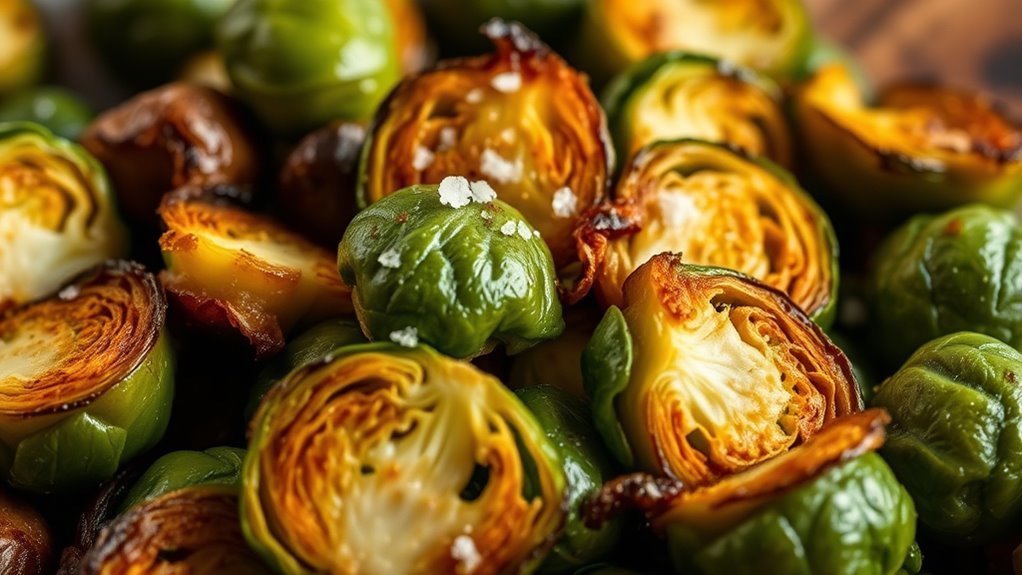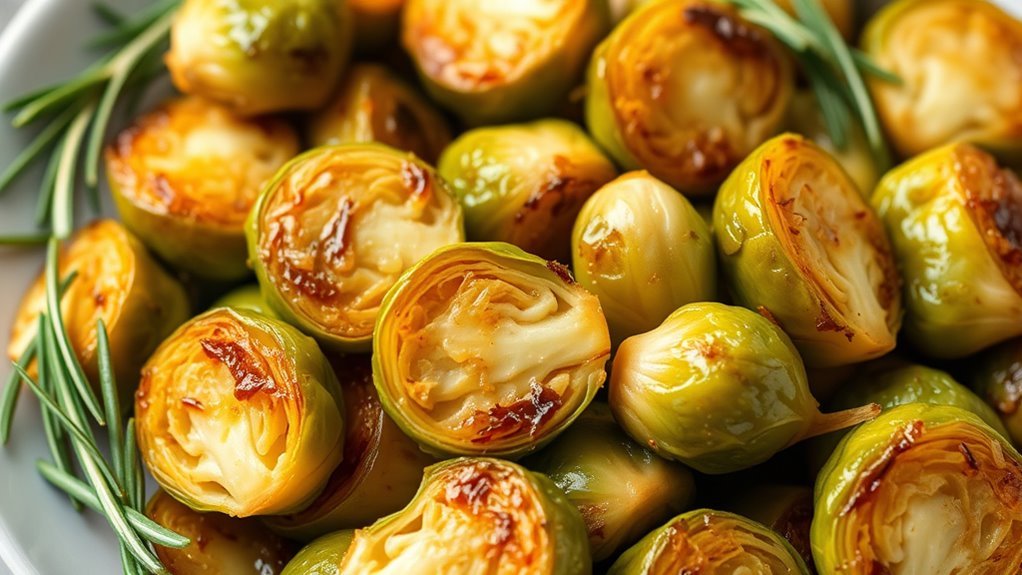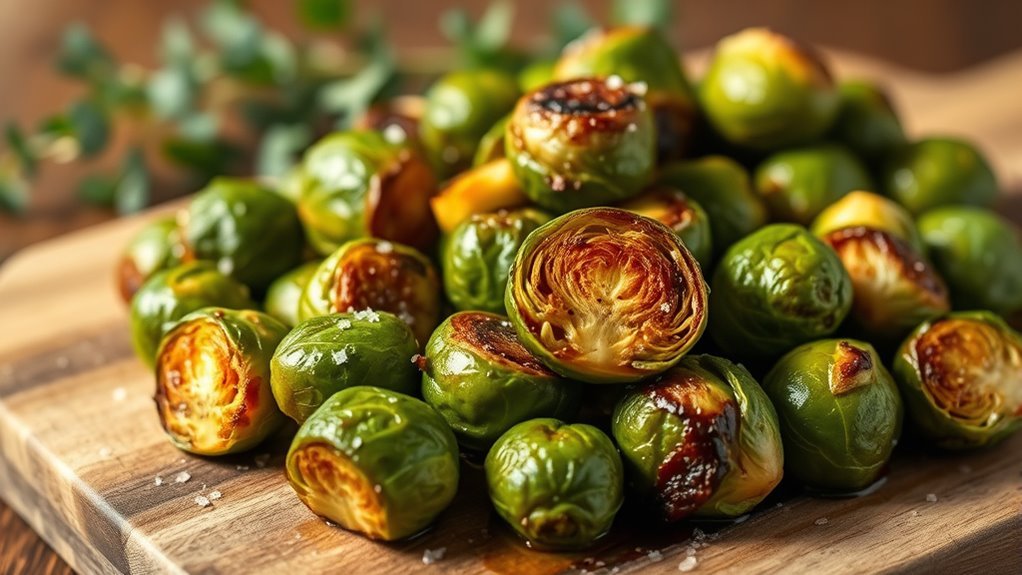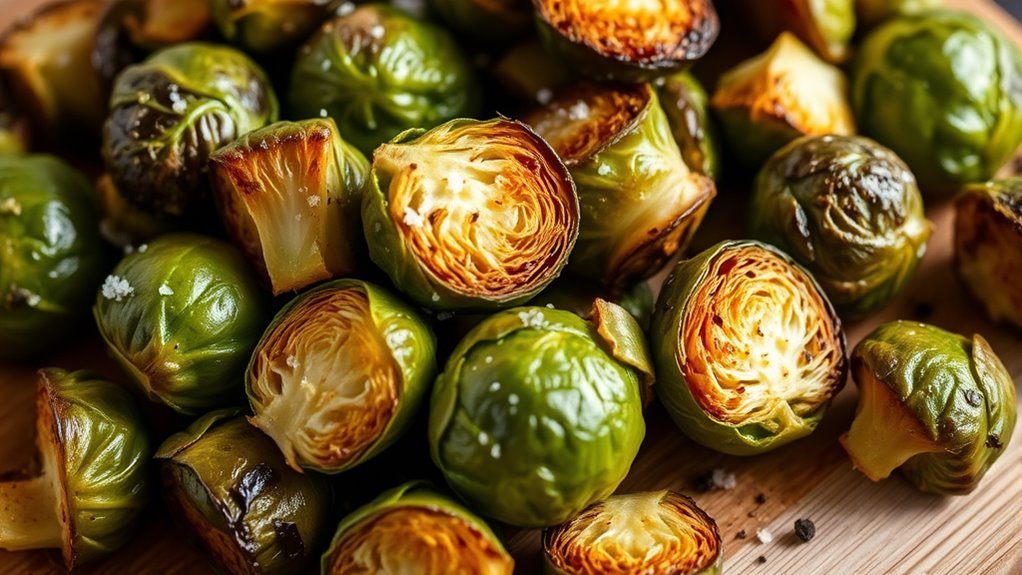Yes, roasted Brussels sprouts are keto-friendly! With only about 5-6 grams of net carbs per 100-gram serving, they fit perfectly within low-carb diets. They’re also low in calories, high in fiber, and packed with vitamins and antioxidants, making them a nutritious choice. For the best flavor, prepare them with low-carb seasonings and serve alongside proteins or healthy fats. If you’re curious about how to enhance this delicious dish or explore alternative veggies, there’s more to discover!
Understanding the Nutritional Profile of Brussels Sprouts

When you consider adding Brussels sprouts to your diet, you’ll find they’re not just tasty but also packed with nutrients. These little green gems are low in calories and high in fiber, making them a great choice for anyone looking to maintain a healthy lifestyle. With their rich vitamin C, vitamin K, and antioxidants, Brussels sprouts support your immune system and overall health. If you’re following a keto diet, you’ll appreciate their keto compatibility; they have a low carbohydrate content, allowing you to enjoy them without compromising your macros. Plus, their versatility means you can roast, sauté, or steam them, ensuring they fit seamlessly into your meals. Embracing Brussels sprouts can be a delicious step toward better nutrition.
Carbohydrate Content in Roasted Brussels Sprouts

When considering roasted Brussels sprouts as part of a keto-friendly diet, it’s crucial to understand their carbohydrate content. A standard serving typically contains around 8 grams of carbs, but portion size can greatly impact your total intake. By analyzing the nutritional profile, you’ll be better equipped to enjoy this vegetable while staying within your carbohydrate limits.
Nutritional Profile Overview
Although you might think of Brussels sprouts as a high-carb vegetable, roasted Brussels sprouts actually offer a surprisingly low carbohydrate content, making them a great option for those following a keto diet. These little green gems are packed with nutritional benefits, including fiber, vitamins C and K, and antioxidants. With their rich nutrient profile, they support overall health while keeping your carb intake in check. One cup of roasted Brussels sprouts typically contains about 8 grams of carbohydrates, allowing you to enjoy a flavorful side dish without derailing your keto goals. Plus, their versatility means you can easily incorporate them into various meals, giving you the freedom to enjoy healthy eating while sticking to your dietary preferences.
Carb Count Analysis
While many vegetables can be high in carbohydrates, roasted Brussels sprouts stand out with their impressively low carb count, making them a favorable choice for those on a keto diet. Typically, a 100-gram serving contains around 5-6 grams of net carbs, which is markedly lower than many common carb sources like potatoes or rice. This low carb content allows you to enjoy Brussels sprouts without compromising your daily carb limit. They’re also packed with fiber, which can aid digestion and help you feel full. If you’re seeking keto alternatives to higher-carb vegetables, roasted Brussels sprouts are an excellent option. Their versatility in dishes means you can easily incorporate them into your meals while staying on track with your keto lifestyle.
Portion Size Considerations
Understanding portion sizes is key to maximizing the benefits of roasted Brussels sprouts on a keto diet. By adhering to dietary guidelines, you’ll guarantee you stay within your carb limits. Here are some serving size considerations to keep in mind:
- Standard Serving Size: Aim for about 1 cup of roasted Brussels sprouts.
- Carbohydrate Content: This serving typically contains around 8 grams of carbs.
- Adjusting Portions: If you’re close to your daily carb limit, consider reducing to ½ cup.
- Pairing Wisely: Combine with healthy fats to maintain your keto balance.
Health Benefits of Brussels Sprouts on a Keto Diet

Brussels sprouts pack a powerful nutritional punch, making them an excellent choice on a keto diet. With their low carb content and high levels of vitamins and minerals, they support your health while keeping your carb intake in check. Plus, their antioxidant properties can help combat oxidative stress, promoting overall well-being.
Nutrient Density Benefits
When you incorporate roasted Brussels sprouts into your keto diet, you’re not just adding a delicious side dish; you’re also boosting your nutrient intake considerably. These little greens are packed with nutrients that enhance your overall health. Here are some key benefits:
- High in Fiber: Promotes better nutrient absorption and aids digestion.
- Rich in Vitamins: Offers vitamins C and K, essential for immune support and bone health.
- Phytochemical Benefits: Contains antioxidants that may reduce inflammation and fight disease.
- Low Calorie: Allows you to enjoy a satisfying portion without compromising your caloric goals.
Low Carb Content
As you explore options for your keto diet, you’ll find that the low carb content of roasted Brussels sprouts makes them an excellent choice. With just 5 grams of net carbs per cup, they fit seamlessly into your meal prep, allowing for a delicious side or main dish while maintaining your carb limits. The roasted flavor enhances their natural sweetness, making them a crowd-pleaser.
Here’s a quick comparison of Brussels sprouts with other common vegetables:
| Vegetable | Net Carbs (per cup) | Roasted Flavor |
|---|---|---|
| Brussels Sprouts | 5 | Yes |
| Broccoli | 4 | Yes |
| Cauliflower | 2 | Yes |
| Green Beans | 4 | Yes |
Incorporating Brussels sprouts into your meals offers a tasty, low-carb option for your keto lifestyle.
Antioxidant Properties
Rich in antioxidants, roasted Brussels sprouts provide essential health benefits that align well with a keto diet. Their antioxidant effects help combat oxidative stress and inflammation, promoting overall wellness. Here are some key health benefits you can enjoy:
- Cell Protection: Antioxidants neutralize free radicals, protecting your cells from damage.
- Reduced Inflammation: The anti-inflammatory properties may lower your risk of chronic diseases.
- Heart Health: Antioxidants support cardiovascular health by improving blood vessel function.
- Immune Support: Nutrients in Brussels sprouts strengthen your immune system, keeping you healthier.
Incorporating roasted Brussels sprouts into your keto meals not only adds flavor but also boosts your nutrient intake, supporting your journey toward better health and well-being.
Tips for Preparing Keto-Friendly Roasted Brussels Sprouts
Although preparing keto-friendly roasted Brussels sprouts might seem straightforward, a few key tips can elevate your dish and guarantee it aligns perfectly with your dietary goals. Start with proper preparation techniques: trim the ends and halve larger sprouts for even cooking. Roasting at a high temperature, around 425°F, helps achieve that desirable crispy texture. When it comes to seasoning options, stick with low-carb ingredients like olive oil, garlic, and your favorite herbs. Adding a sprinkle of Parmesan cheese before roasting can enhance flavor without compromising your keto diet. Finally, keep an eye on cooking time; you want them tender yet slightly caramelized. These tips will make your Brussels sprouts not just keto-friendly, but also a delightful addition to your meals.
Pairing Roasted Brussels Sprouts With Other Keto Foods
When you’re looking to create a satisfying meal, pairing roasted Brussels sprouts with other keto-friendly foods can enhance both flavor and nutritional value. Here are some delicious options to take into account:
- Keto Dips: Serve with creamy avocado or spinach dip for extra richness.
- Protein Sources: Pair with grilled chicken or salmon to boost your meal’s protein.
- Cheeses: Crumbled feta or parmesan can add a savory touch and healthy fats.
- Nuts and Seeds: Toss in some crushed walnuts or sunflower seeds for crunch and additional nutrients.
These flavor pairings not only complement the earthy taste of Brussels sprouts but also align perfectly with your keto lifestyle. Enjoy the freedom of experimenting with different combinations to find your favorite!
Portion Control: How Much Is Too Much?
How do you know if you’re eating the right amount of roasted Brussels sprouts on a keto diet? Portion sizes play an essential role in maintaining your carb intake. Mindful eating helps you enjoy these veggies while staying within your limits. A typical serving is about 1 cup, but it’s easy to overindulge.
Here’s a quick reference:
| Portion Size | Carbs per Serving |
|---|---|
| 1/2 cup | 4g |
| 1 cup | 8g |
| 1.5 cups | 12g |
| 2 cups | 16g |
| 3 cups | 24g |
Keeping track of these portion sizes guarantees you enjoy roasted Brussels sprouts without compromising your keto goals. Remember, balance is key!
Alternative Low-Carb Veggies to Consider
Maintaining your carb intake means exploring a variety of low-carb vegetables that can complement your keto diet. Here are some delicious alternatives to ponder:
- Zucchini noodles: A great pasta substitute, low in carbs and full of flavor.
- Cauliflower mash: Creamy and satisfying, this is a perfect alternative to traditional mashed potatoes.
- Spinach salad: Packed with nutrients and low in carbs, it’s a rejuvenating option for any meal.
- Radish fries: A crunchy snack that satisfies your fry cravings without the carbs.
You can also enjoy eggplant slices, asparagus spears, broccoli florets, and bell pepper for added variety. Incorporating these veggies can provide freedom in your meals while keeping your carb count in check.
Frequently Asked Questions
Can I Eat Brussels Sprouts Raw on a Keto Diet?
You can definitely eat raw Brussels sprouts on a keto diet! They’re low in carbs and high in fiber, making them keto-friendly. Eating them raw offers benefits like preserving their vitamin C and antioxidants, which can be diminished through cooking. Plus, the crunchiness adds variety to your meals. Just be mindful of portion sizes to keep your carb intake in check. Enjoy them in salads or as a crunchy snack!
Are Frozen Brussels Sprouts as Nutritious as Fresh Ones?
Frozen Brussels sprouts can be just as nutritious as fresh ones, capturing their goodness like a snapshot in time. While fresh sprouts boast their own benefits, such as a vibrant taste and texture, frozen nutrition often retains most vitamins and minerals due to quick freezing. However, some nutrients may diminish slightly. If you’re seeking convenience without sacrificing health, both options can fit well in your diet, letting you savor the freedom of choice.
What Are Some Common Seasonings for Roasted Brussels Sprouts?
When roasting Brussels sprouts, you can enhance their flavor with several seasonings. Garlic powder adds a savory depth, while balsamic vinegar brings a tangy sweetness that complements their natural earthiness. You might also consider olive oil, salt, and pepper for a classic touch. Experimenting with paprika or Parmesan can elevate your dish even further. The beauty of roasting Brussels sprouts is how versatile they are, allowing you to tailor the seasonings to your taste.
How Do I Store Leftover Roasted Brussels Sprouts?
To store leftover roasted Brussels sprouts, simply seal them in a sturdy, airtight container. For ideal freshness, pop them in the fridge within two hours of cooking. If you’re meal prepping, consider portioning them out for easy access. They’ll stay delicious for about three to five days. When you’re ready to enjoy them again, a quick reheating in the oven or skillet will bring back their delightful crunch.
Can Brussels Sprouts Cause Digestive Issues on a Keto Diet?
Yes, Brussels sprouts can cause digestive issues for some, especially during keto adaptation. Their high fiber content can lead to gas and bloating if your body isn’t used to it. As you adjust to a lower-carb lifestyle, your digestive health may need time to adapt. It’s important to introduce Brussels sprouts gradually and stay hydrated, allowing your system to acclimate while enjoying their nutritional benefits without discomfort.
Frequently Asked Questions
1. Are roasted Brussels sprouts low in carbohydrates?
Yes, roasted Brussels sprouts are low in carbohydrates. A one-cup serving contains approximately 8 grams of carbohydrates, which is relatively low compared to other vegetables. This makes them a suitable option for those following a ketogenic diet, which typically restricts carbohydrate intake to around 20-50 grams per day.
2. How do roasted Brussels sprouts fit into a keto diet?
Roasted Brussels sprouts are an excellent side dish for a keto diet due to their low carb count and high fiber content. They provide essential nutrients while keeping your carbohydrate intake low. When roasted with healthy fats, such as olive oil or butter, they become even more keto-friendly, helping to meet your daily fat intake goals.
3. What nutritional benefits do roasted Brussels sprouts offer?
Roasted Brussels sprouts are nutrient-dense, providing vitamins C and K, folate, and antioxidants. These nutrients help support immune function, bone health, and overall well-being. Additionally, their high fiber content aids in digestion and can promote feelings of fullness, which is beneficial for those trying to manage their weight on a keto diet.
4. Can I add other ingredients to roasted Brussels sprouts while maintaining a keto-friendly dish?
Absolutely! You can enhance the flavor of roasted Brussels sprouts while keeping them keto-friendly by adding ingredients like Parmesan cheese, bacon, garlic, or herbs. Just be mindful of additional ingredients that contain higher carbohydrates, such as sweet sauces or breading, to ensure your dish remains compliant with your keto goals.
5. Are there any potential downsides to eating roasted Brussels sprouts on a keto diet?
While roasted Brussels sprouts are generally healthy, consuming them in large quantities may cause digestive discomfort for some people due to their high fiber content. Additionally, if you are sensitive to certain compounds found in cruciferous vegetables, such as glucosinolates, they may cause gas or bloating. It’s best to enjoy them in moderation and monitor how your body responds.


